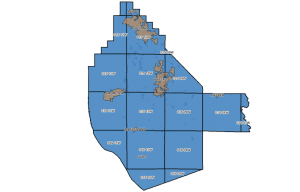County considers animal control costs
The finding of a recent fee study commissioned for the Monroe County Sheriff’s Department may result in some changes for local municipalities and Monroe County pet owners.
The Monroe County Board was given a report of the “cost of services” study by Bruce DeLashmit of Bellwether LLC, a Belleville-based management services and consulting firm.
Monroe County Sheriff Neal Rohlfing explained county entities generally perform fee studies every few years. He noted that most fees cannot be increased without a justification, which a fee study from an independent agency provides.
While the study showed many of the actual cost of services provided by the sheriff’s department were higher than the fees being charged, the biggest issue DeLashmit found was with the county’s animal control services.
The total budgeted operating cost for animal control is $71,871 with expected revenues projected at $19,907 – with no revenue reported to date this fiscal year.
Monroe County’s animal control budget is handled through the sheriff’s department.
DeLashmit explained in his report that “Monroe County is statutorily responsible for (animal control) services in the unincorporated areas of the county; however, the current program provides these services throughout the county without inter-governmental agreements with municipalities.
“Partnering with municipalities through inter-governmental agreements are the best models to ensure that proper coverage is provided to cities and towns where animal population density is the highest,” DeLashmit continued.
In addition to the MCSD budget bearing the entire cost of the program, DeLashmit also pointed out a lack of an intergovernmental agreement “places the animal control officer in questionable authority when acting within the municipal boundary.”
DeLashmit recommended establishing a cost-sharing intergovernmental agreement with county municipalities, unincorporated areas and villages with a population below 1,000 to cover the budget deficit based on population.
For example, if a cost-sharing agreement was established, Waterloo and Columbia would each pay around 31 percent each per year to supplement the deficit.
Based on the current deficit of nearly $52,000, each city would pay the county around $16,000 per year for animal control services.
Another method to help with the cost of animal control involves local veterinary offices.
DeLashmit supplied commissioners a proposed fee table for animal registration, vaccination, impoundment, euthanasia and microchip fees. The fees would be charged during visits to county vet offices, with the offices receiving a $2 administrative fee for pet registration.
The fee study was a discussion item only. Monroe County Board Chairman Dennis Knobloch expressed a desire to meet with local veterinarians to make sure they would be willing to administer the fees before proposing any official action.
Knobloch told the Republic-Times the county at one time had a “dog tax” paid through the treasurer’s office, but it is no longer in effect.
He further explained Monroe County would be reimbursed through veterinary offices if they agree to participate. He also noted the maximum charges Monroe County could impose are those listed in the fee study.
For unaltered cats and dogs, the maximum registration fee would be $24 and $16 for altered animals. The registration fee could potentially be applied when annual rabies vaccines are administered, although the details need to be finalized before any changes would take place.
Rohlfing said Monroe County “has a better (animal control) service than most counties.”
With costs going up in nearly every aspect of life, he explained the department is trying to ensure it remains financially solvent while keeping up its level of service to the county.
Rohlfing noted the primary income for the sheriff’s department comes from real estate taxes and federal inmate housing and, to a lesser degree, fees from sheriff services such as process service.
In other business, commissioners approved an engineering agreement with Gonzalez Companies LLC for the Rogers Street North Project in the amount of $24,995.
The engineering work is part of a plan to realign Rogers Street and Country Club Lane in rural Waterloo.
Commissioners also approved a county-based line of credit renewal for the Monroe-Randolph Transit District.
At last Tuesday’s meeting of the Monroe County Zoning Board of Appeals, the lawyer for construction company Parallel Towers asked for the agenda item for a cell tower setback variance be tabled until the next meeting in order to give the company time to examine aspects of its proposal.
Parallel Towers was commissioned by AT&T to find a suitable location in an area just south of Columbia for a new tower to house equipment for its cellular network.
The Monroe County Planning Commission Land Use Committee voted unanimously to deny recommendation of variance at 129 Hayden Drive at its Feb. 10 meeting.
The zoning board voted to table consideration of the tower setback variance until its April 5 meeting.






